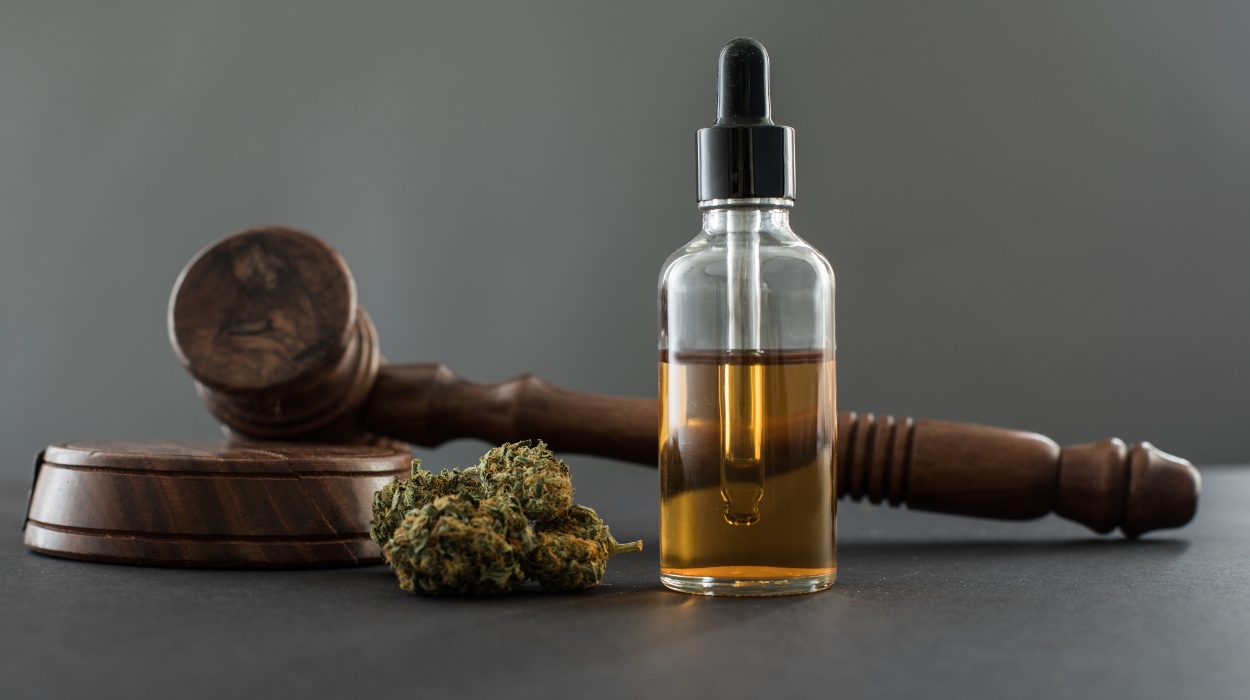 Expert's opinion
Expert's opinion
Expert's opinion
The article is a subjective view on this topic written by writers specializing in medical writing.
It may reflect on a personal journey surrounding struggles with an illness or medical condition, involve product comparisons, diet considerations, or other health-related opinions.
Although the view is entirely that of the writer, it is based on academic experiences and scientific research they have conducted; it is fact-checked by a team of degreed medical experts, and validated by sources attached to the article.
The numbers in parenthesis (1,2,3) will take you to clickable links to related scientific papers.
CBD Oil Side Effects & Drug Interaction: How To Avoid? 2024

CBD oil stands for cannabidiol oil which is only an extract of the cannabis plant. There are about 130 such extracts from the plant itself and yet CBD accounts for up to 40% of the plant’s extract. But is CBD safer than medical cannabis and should you even mix it with any other drugs?
In this post, you’ll learn exactly some of the reactions you can expect from CBD oils, some of the long-term adverse effects, but also its interaction with prescribed medicine. We’ll also do our best to teach you when to give up the CBD oil for a while if needed.
There’s nothing wrong with relying on CBD oil. But some drugs interact with CBD oil and this might not always end up positively. Please keep in mind that the side effects can vary from one person to the other.
And as we all know it, no drug comes without consequences or at least reactions so keep on reading to learn what to expect out of the CBD oil!
Side Effects Of CBD Oil
1. Short-term effects:
- Drowsiness
- Dizziness or Lightheadedness
- Nausea
2. Long-term effects:
- Dry Mouth
- Increased Liver Enzymes

Short-term, Adverse Reactions Of Using CBD Oils
Drowsiness

You might have heard that CBD oils have proven to be very efficient for people with sleeping issues such as insomnia and other sleeping disorders.
Instead, people who aren’t suffering from any sleeping disorders might feel extremely sleepy or drowsy after taking CBD oil.
It can also make others remain wide awake hence, this side effect isn’t inconsistent for a particular drug, it can cause drowsiness in others and help alleviate the same in other people. Hence, while some can experience relaxation with CBD oil, others experience the paradoxical effect of irritability.
This is one of the most common short-term side effects of using CBD oil, but still, you shouldn’t operate any heavy machinery or drive a vehicle until these side effects pass.
Dizziness Or Lightheadedness
CBD oil can also make you dizzy or lightheaded if you have normal or low blood pressure when you start taking CBD oil.
Luckily, you can manage this side effect by drinking caffeinated drinks such as a cup of coffee or an energy drink. You should also consider lowering your dosage and finding the lowest dose that you will enjoy without feeling dizzy.
This will help your body regain its full function in no time, eliminating this short-term side effect for good.
But we highly recommend you drink a lot of water, instead of only relying on caffeinated drinks because caffeine can also drain your body.
Nausea
Extremely high doses of CBD have been known to cause side effects such as diarrhea and vomiting.
That being said, another possibility upset stomach, diarrhea, and gastrointestinal distress are not typically caused by cannabidiol CBD oil itself, but rather by ingredients used to deliver CBD oil into the body or flaws during production.
If you’re experiencing these symptoms, stop taking CBD oil for a day or two to identify that it’s a supplement and not some other issue (your diet, stress) that is causing your discomfort. Then, try taking the CBD oil again at half the dose you were taking before. If it’s still bothering you, try a different type of CBD, or perhaps an entirely different method applied to the skin, rather than through the stomach.
Long-term CBD Effects
Unfortunately for all CBD oil product users – CBD also has long-term effects which are a lot more drastic than the short-term effects. They are a lot more serious and while one could deal with short-term effects – you might not want to deal with long-term effects of CBD.
Therefore, if you experience any of the long-term CBD effects, you might want to reconsider the CBD oil products you are using.
Even though the long-term effects of CBD might not make every user stop – they certainly might make things a bit more difficult for some individuals.
Dry Mouth
One of the most common long-term side effects of CBD oil products is the dryness of the mouth and there are high chances you’ve experienced this by now.
While most people disregard it quickly – this might be a big issue of the effect of the endocannabinoid system process on the secretion of saliva.
This could quickly lead to other issues such as caries and periodontitis. Since saliva protects the gums and soft tissue of your mouth – dryness of the mouth could expose the inside of your mouth to bacteria and corrosion.
Increased Liver Enzymes
One of the hardest long-term side effects of CBD oil products is an increased liver enzyme. When this happens, it often results as a marker of inflammation which could also lead to liver damage.
On the bright side, only about 10% of CBD oil users experience this side effect. However, you still shouldn’t underestimate this issue.
Instead, you should address it as soon as possible if you start experiencing any problems with the liver.
The most interesting fact is that CBD oil can help patients who have liver failure. This just shows how much is still there to learn and understand about CBD oil – but for now, CBD oil seems to be doing great things for people with liver failure.
Allergic Reaction To CBD Oil
In case of an allergic reaction to CBD oil, you could experience some breathing problems or an itchy nose.
When the body sees any product as an allergen, an allergic reaction tends to occur. Most allergies come from medications, foods, pollen, insect stings, and pet dander. However, since CBD is derived from the cannabis sativa plant, it contains properties like histamine and pollen that can trigger allergic reactions.
Although allergies to CBD oil are rare, it is still possible for you to be allergic to CBD. However, due to its anti-allergenic and antihistamine properties, CBD has also been shown to help with allergies.
We recommend that you stop the use of CBD once you notice any allergic reactions to it.
Diarrhea And Change In Appetite & Weight

A study[1] was conducted on people with severe epilepsy between the ages of 1 and 30, 19% experienced diarrhea. The potential reasons for this were concluded to be due to the CBD carrier and dosage.
The ingredients in CBD oil could contribute to gastrointestinal distress and cause diarrhea and loose stool, especially for people who aren’t used to taking cannabinoids. However, the dosage and concentration in the study were relatively high compared to the normal dosage recommended by commercial CBD products.
Hence, you should carefully consider how much you consume. Stop using CBD oil for a day or more to ensure the diarrhea isn’t being caused by something else. Lower the dosage if diarrhea goes away or find a CBD brand that doesn’t contain a carrier oil.
Studies also show that it can potentially decrease or increase the user’s appetite and weight. However, this depends on your biology. This could also be a result of another ingredient in the oil you are consuming. Consult your doctor instead of these two.
Effect On Patients With Movement Disorders
Patients with movement disorders are dealing with an incredible amount of chronic pain we can hardly imagine. But do CBD oil and movement disorders go well together?
That’s why a study was done in 2006 by the International Journal of Neuroscience. Patients were treated with 100-600 mg of CBD oil daily over 6 weeks.
By the end of the 6th week, the study concluded that CBD oil actually helped patients with movement disorders and even helped show signs of improvement for such conditions.
But you should never forget that CBD oils come with side effects just like any other drug. Therefore, the people tested in this study also experienced some side effects such as low blood pressure, dryness of mouth, drowsiness, and lightheadedness.
All of the side effects could lead to many other conditions (if left uncontrolled) – however, we hopefully think that a good balance between the health benefits of CBD treatment and its side effects will be found.
So far, we can only continue to experiment with the dosage.
Side Effects Of FDA-Approved Drug For Epilepsy
In legal words – CBD is pretty unregulated so far. But that doesn’t mean you should stay away from CBD oil products. Why?
Because even some of the FDA-approved drugs for battling conditions such as epilepsy come with side effects. Some of these products have worse side effects than CBD oil.
These side effects are:
- Liver problems
- Infections
- Reduced urination
- Breathing problems
- Mood swings
There are many other side effects. But on the bright side, CBD side effects don’t seem to be so harsh for people who are already suffering from serious conditions.
This leads us to believe that there will be a lot more testing and studying related to CBD to have it FDA-approved as the main way to treat various conditions.
Interaction With Pharmaceutical Drugs
Almost every adult person is taking some kind of pharmaceutical drug, whether it’s prescribed by a doctor or it’s purchased over the counter.
Therefore, most of the users who combine pharmaceutical drugs with CBD oil products should be careful of any additional effects of the drug.
One of the biggest issues about the interaction of CBD oil products with pharmaceutical drugs is that CBD oils impede the activity of enzymes in the liver.
CBD oil is known to require the same enzyme to be metabolized as the one found in the liver which is one of the biggest reasons why interaction with pharmaceutical drugs may lead to liver issues.
Even though this doesn’t apply to everyone, we still advise everyone to consult with their doctor to prevent any long-term issues over something that could be just a temporary issue due to the interaction.
You are advised to avoid CBD if your medications come with a grapefruit warning on the label. According to the FDA,[2] consuming grapefruit while on use drugs to treat high blood pressure, and anti-anxiety can result in a higher concentration of the medication in the bloodstream, negative side effects, or an overdose.
There is preliminary evidence that CBD could have a similar effect to grapefruit juice, impairing how your body metabolizes drugs, and raising serum levels of those medications in your body. And, because cytochrome P450 is responsible for the metabolism of numerous medications, proceed with caution before mixing any prescription pharmaceutical with CBD
However, with careful supervision from your doctor, you could still be able to safely use CBD with most medications, even those that come with a grapefruit warning. Your doctor may ensure this by monitoring your liver functioning and plasma serum levels of the medications you are taking.
Interactions With Fats And Fat-containing Foods
Taking cannabidiol with a meal that is high in fat increases the amount of cannabidiol that is absorbed by the body. This might increase the effects and side effects of cannabidiol.
Special Precautions & Warnings
During Pregnancy
One thing we know is that marijuana products can affect babies. And this is fairly common with other products such as alcohol or smoking.
Plenty of studies have been done and some of them are still in progress. However, all of them are trying to focus on a certain point and the results are mixed.
These results show that CBD oil can disrupt fetal brain development – yet some studies prove that, in fact, it can promote healthy fetal brain development.
Therefore, we believe you should strictly stay off CBD oil during pregnancy or while she is still breastfeeding her child- whether it might or might not be good for a child and take special precautions and warnings during pregnancy.
Children Below 2 Years Of Age
Even after the pregnancy, you should still be careful about the consumption of CBD oil around children, especially children below 2 years of age.
If you aren’t careful, even the smallest traces of THC from CBD oil might affect your baby’s health.[3]
We highly recommend speaking to your doctor about the side effects and proper use of oral CBD oil, as well as using pure CBD oil. While children above 2 years can use CBD, parental and doctor supervision should be ensured all the time. This is especially true for parents using CBD oil to treat epilepsy.
When Taking Antipsychotic, Antidepressant Drugs
Remember how we said that CBD oil might have better improvements with less harmful side effects for people who are suffering from psychotic disorders?[4]
This is one of the biggest reasons why more and more people are choosing CBD oil products over FBA-approved & prescribed products to deal with their disorders.
However, even though we believe that CBD oil might help up to a certain point – we are still true believers that CBD oil consumers should do their research before just heading straight down the CBD oil path.
Since CBD oil is still very unknown, it has only commonly known side effects so far, and it has its presence in various ways for various individuals – you should really be careful even if you start using CBD oil products and you feel like they’re helping.
You might be suffering from short or long-term effects of CBD oil that could lead to other problems and are better yet avoided at the cost of going for only one CBD FDA-approved product.
Liver Disease
People with liver disease may need to use lower doses of cannabidiol compared to healthy patients
Parkinson’s Disease
Some early research suggests that taking high doses of cannabidiol might make muscle movement and tremors worse in people with Parkinson’s disease
Is CBD Safe?
Yes! According to WHO, it is safe to use CBD oil.[5]
However, If you are looking to start using CBD as an add-on therapy to ease the symptoms of a specific condition, we recommend talking to your doctor about it first. You need a doctor to help determine the best CBD product for you, the right dosage, and a schedule that will be safe with your medications.
Before getting into the CBD world, it is always safer to do your research beforehand. In some cases, your doctor may want to monitor the blood plasma levels of the medications you are taking. Hence, unless your doctor tells you it is safe to do so, never stop any of your medications to start using CBD.
Final Thoughts
To ensure safety while taking CBD oil and other medications, you should always consult your healthcare provider. This is especially crucial if you have a health condition where you are taking medications for the condition.
Unless your doctor gives you a go-ahead, never stop taking your prescription meds to try CBD oil as an alternative treatment. This is especially important if you are taking medications that come with a grapefruit warning.
Your doctor will help you formulate a plan that works for you by closely monitoring the levels of medications in your system. This will allow you to comfortably use both your prescription as well as CBD as a therapy.
Your pharmacist or doctor will also be able to recommend quality CBD products that will suit both your health and therapeutic needs.
+ 5 sources
Health Canal avoids using tertiary references. We have strict sourcing guidelines and rely on peer-reviewed studies, academic researches from medical associations and institutions. To ensure the accuracy of articles in Health Canal, you can read more about the editorial process here
- Iffland, K. and Franjo Grotenhermen (2017). An Update on Safety and Side Effects of Cannabidiol: A Review of Clinical Data and Relevant Animal Studies. Cannabis and cannabinoid research, [online] 2(1), pp.139–154. doi:https://doi.org/10.1089/can.2016.0034.
- Office (2021). Grapefruit juice can affect how well some medicines work. [online] U.S. Food and Drug Administration. Available at: https://www.fda.gov/consumers/consumer-updates/grapefruit-juice-and-some-drugs-dont-mix.
- Office (2020). What You Should Know About Using CBD When Pregnant or Breastfeeding. [online] U.S. Food and Drug Administration. Available at: https://www.fda.gov/consumers/consumer-updates/what-you-should-know-about-using-cannabis-including-cbd-when-pregnant-or-breastfeeding.
- Batalla, A., Janssen, H., Gangadin, S.S. and Bossong, M.G. (2019). The Potential of Cannabidiol as a Treatment for Psychosis and Addiction: Who Benefits Most? A Systematic Review. Journal of Clinical Medicine, [online] 8(7), pp.1058–1058. doi:https://doi.org/10.3390/jcm8071058.
- Geneva (2018). CANNABIDIOL (CBD) Critical Review Report Expert Committee on Drug Dependence Fortieth Meeting. [online] Available at: https://www.who.int/docs/default-source/controlled-substances/whocbdreportmay2018-2.pdf?sfvrsn=f78db177_2.
